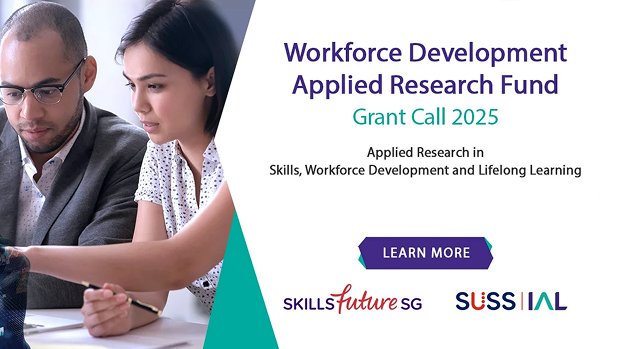The Workforce Development Applied Research Fund (WDARF), a national-level research fund offered by the SkillsFuture Singapore (SSG), aims to foster high quality and rigorous applied research in workforce development and lifelong learning to support the SkillsFuture Singapore's key thrusts and national-level policies. It encourages inter-disciplinary research and seeks to strengthen research capabilities, through leveraging both local and international expertise. The WDARF Grant Call is administered by the Institute for Adult Learning (IAL) on behalf of the SkillsFuture Singapore (SSG). The grant is awarded through an open, competitive bidding approach, where submitted proposals go through a technical expert review and evaluation, before they are presented to a Research Committee for approval.

Workforce Development Applied Research Fund (WDARF) 2025 Grant Call
The WDARF 2025 Grant Call is now closed for Expression of Interest (EOI) submission.
Previous Result
Grant Call 2021
Battling Ageism, Myths, Misperceptions of Mature and Older Workers and Learners: Breaking Barriers, Mitigating Precarity, and Finding Fulfilment in Late Adulthood
Mr Poon King Wang, Singapore University of Technology and Design
This research study adopts an ecosystem/whole of society lens to understand ageist beliefs and proposes ways to breakdown these perceptions. Additional aims are to understand how mature/older workers plan for and transit into different phases of learning, work, and retirement as they experience change in priorities, health conditions, financial circumstances, and life aspirations, and how lifelong learning enriches them so that they continue contributing to the economy and positively influence society.


Grant Call 2021
How and Why University Graduates Seize Opportunities Offered by Lifelong Learning Policies
Dr Paul A. O'Keefe, National University of Singapore
This project will provide a comprehensive, interdisciplinary approach to understanding participation in Lifelong Learning (LLL) programmes, particularly SkillsFuture Credits and other SkillsFuture programmes. We will focus predominantly on university graduates, to understand key factors that lead highly educated workers to use LLL policies, and how such policies could be designed to encourage greater usage of LLL programmes.


Grant Call 2021
Improving Professional Development through an Intelligent Adaptive Learning Approach: An In-depth Study on Construction Project Managers
Associate Professor Goh Yang Miang, National University of Singapore
This study focuses on the use of an adaptive learning approach to improve professional development for construction project managers. Adaptive learning, which has been successful in higher education, offers personalized learning pathways that can address the time constraints faced by professionals. However, there is limited research on the effectiveness of adaptive learning in professional development.


Grant Call 2020
Socio-cultural factors shaping Singaporean Malay-Muslim workers’ decisions regarding employment and training
Dr Mohamad Shamsuri Juhari, National University of Singapore
The project will focus on the socio-cultural dynamics which serve to motivate or inhibit Singaporean Malay/Muslim Community (MMC) workers from actively seeking pathways to enhance their career and work life. It aims to identify and examine specific socio-cultural factors that serve to frame the decision-making processes of working-age adults from the MM community with regards to enhancing their individual career and work life. The project also seeks to recommend solutions to address the challenges posed by these factors.


Grant Call 2020
Neurophysiological Measures for Task Handling Complexity
Prof Lye Sun Woh, Nanyang Technological University
The proposed project seeks to investigate and possibly develop a new evaluation measure known as the “capability-task quotient” (C-TQ) using neurophysiological characteristics of the operator over a time period when handling various task complexities. The aim is to measure and analyse both short and sustained level of neurophysiological activities and characteristics of the operator over a period of time when handling various task complexities in a certain work environment setting. The results would have potential to reshape how humans are hired, allocated or assessed with regards to a given task or job scope. If market size is an indicator, this would translate into billions of dollars of savings with a more efficient, effective fulfilled workforce with greater latitude to minimise human errors. The type of task learning and training required by the operator can also be enhanced.



